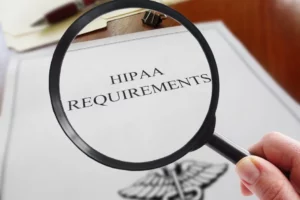Originally established to redefine the healthcare industry, HIPAA laws oversee how protected health information (PHI) is used and disclosed. They apply exclusively to healthcare providers and health insurance plans. HIPAA laws are thorough, intricate, and — at times — difficult to understand. They are merely the metaphorical “floor,” or bare minimum, of regulatory guidelines to follow regarding a patient’s medical information.

HIPAA laws establish national standards for the use of health data and hold healthcare providers and insurance companies accountable for their use of PHI. HIPAA regulations have been adapted to focus on patient rights in a digital world. As the amount of cyber attacks continues to increase, HIPAA laws help protect both providers and patients from data breaches.
What is HIPAA?
The Health Insurance Portability and Accountability Act, or HIPAA, protects a patient’s identifiable health information. These federal laws apply to covered entities (CEs), such as physicians, doctors’ offices, or health insurers. Businesses contracted with a CE may perform a service on their behalf and, as such, come into contact with PHI. Also known as a business associate (or BA), these entities are also required to comply with HIPAA regulations. A BA that comes into contact with PHI must sign a Business Associate Agreement, or BAA.

There are three main rules outlined under HIPAA, and each rule serves a different purpose. However, they are ultimately in place to articulate a patient’s rights and to regulate how covered entities can use PHI.
What are the Three Rules of HIPAA?
HIPAA regulations operate primarily under three basic rules: the Privacy Rule, the Security Rule, and the Breach Notification Rule. These standards are laid out to secure and safeguard a patient’s valuable health information. Here is more information about each of these rules:
The Privacy Rule:
The Privacy Rule protects patients’ rights by governing how PHI can be used without patient authorization. Patient rights under the HIPAA Privacy Rule may include obtaining a copy, examining, and requesting corrections to their medical records.
The Security Rule:

The HIPAA Security Rule was established as an industry standard for protecting a patient’s sensitive information. Under the rule, CEs are required to implement certain safeguards to secure PHI. Examples may include HIPAA compliant email services, domain registration, and encrypting email data.
The Breach Notification Rule:
A data breach is an unfortunate reality for healthcare providers. A breach occurs when PHI is accessed, used, or disclosed in a manner that violates HIPAA regulations. The Breach Notification Rule is in place to notify affected patients of the data breach. It also requires CEs to take action in the event of a data breach. This can include security tactics such as strengthening passwords and data encryption.
What is PHI?

Maintaining the integrity of PHI is a key aspect of HIPAA compliance. PHI contains one or more identifiable factors regarding a patient’s health information that need to be kept private. A patient’s name, date of birth, social security number, phone number, home address, or driver’s license number are all applicable examples. If this information is not properly secured, a data breach can occur. Data breaches put medical practices in turmoil and cause reputational, financial, and emotional damage to the affected patients.
Why are HIPAA Regulations Important?
A patient’s PHI is one of the most valuable pieces of information imported into electronic healthcare systems. Digital healthcare platforms optimize convenience not only for healthcare facilities but also for their patients. Cybercriminals like hackers can use electronic medical records to commit Medicare fraud, steal a patient’s identity, and install ransomware.

Cyberattacks can be damaging to your reputation and costly to your medical practice. Computers get faster and smarter every day. As their capabilities increase, so do the chances of falling victim to a cyber attack. Since 2020, there has been a 45% surge in cyber attacks regarding medical records. HIPAA regulations are necessary because they oversee and promote practices to keep CEs safe from data breaches.
Having a HIPAA compliant email service protects valuable patient information at rest and in transit. Prioritizing data security protects patients’ medical information and also establishes a secure reputation for healthcare providers. The purpose of HIPAA is to give patients positive control over their protected health information.

One of the most effective ways to adhere to the standards that HIPAA requires is through a secure email service. Cloud-based email platforms allow you to send and receive secure messages from your email address. Apart from laptop loss, improperly encrypted backup data is one of the most common types of data breaches. Don’t let your data fall victim to another data breach. If you are looking for the best HIPAA compliant email service, contact our office today.
Get Started With HIPAA Compliant Email Services
Enterprise Guardian offers HIPAA secure emails for healthcare providers, insurance companies, health maintenance organizations, and more. Our HIPAA email services will protect your data at all times, verifying that PHI is not shared with unauthorized individuals. Reach out to our team today to learn more about our HIPAA compliant email services.

